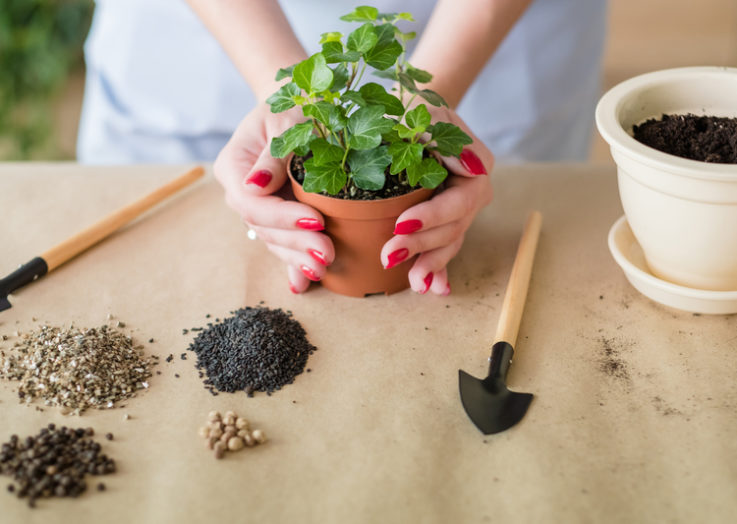Weeding, pruning, and digging in the dirt. To some (myself included), that may sound like heaven, yet to others, that may sound like a list of difficult, undesirable chores (especially the weeding part). Yet gardening offers so much more than curb appeal or fresh vegetables, fruits, herbs and spices on your dinner plate. In fact, there are plenty of health benefits of gardening, and many of them are surprising. 1
Gardening feeds not only the body but also the soul. Here are just 7 health benefits of gardening—compelling reasons to dig deep, get your hands dirty, and make time for nature.
7 Health Benefits of Gardening & Planting
1. A Healthy Appreciation of Vegetables
Despite being told time and again to eat more vegetables and fruit, the vast majority of us still don’t eat enough (at least 2 cups of vegetables and 1 ½ cups of fruit per day). In fact, only 1 in 10 Americans meet those recommendations, according to the Centers for Disease Control and Prevention. 2
If you are the type to eat around your peas, tomatoes, or zucchini (or take them off your plate altogether) in favor of something that tastes less “planty,” one of the health benefits of gardening is that growing your own can transform those veggies you dislike into ones you love. (Yes, really!)
One study from the University of Florida, for example, found that college students who gardened (either presently or as children) were more likely to develop a lasting habit of eating more vegetables and fruits. 3 Fortunately, a growing trend in schools is gardening and farm-to-school programs, giving kids more opportunities to not only garden but to (quite literally) consume the fruit of their labor.
While it tends to be easier for children who use their green thumbs to pick up the habit of eating the veggies they grow, it’s never too late to start to gain a new appreciation for vegetables you didn’t necessarily love growing up.
You can start slowly with just a small plot of land or even a container on the patio. Some simple-to-grow vegetables include greens of many types (e.g., lettuce, spinach, kale, Swiss chard), tomatoes, cucumbers, and zucchini. (Just don’t overdo it on the zucchini. One plant will feed your entire family.) And you can branch out from there and try new varieties.
2. Promotes Weight Loss
Want to decrease your chances of being overweight? Of course! Community gardeners (i.e., people who garden with others) tend to weigh 11 to 16 pounds less and are up to 62% less likely to be obese compared to their non-gardening counterparts, according to one study from the University of Utah. 4 And those benefits spread to partners of gardeners as they help with gardening chores and benefit from the bounty of vegetables.
In addition to eating more vegetables and fruits, gardeners are also more active. From carrying plants, soil, and mulch, to pulling weeds and raking leaves, to digging holes and planting seeds, to moving containers and equipment and more, gardening requires a plethora of functional physical activity that can get your heart pumping and your body sweating. A good session of yardwork and gardening gets the whole body moving—including all of your muscles and cardiovascular system—and easily qualifies as part of the recommended 30 minutes per day of moderate-intensity physical activity. 5
An hour of light yardwork and gardening burns around 330 calories, which is more than you burn for walking at a moderate pace for the same amount of time (~280 calories/hour). 6
3. Gives a Boost to the Immune System
Soil is loaded with microorganisms, including beneficial bacteria (such as Mycobacterium vaccae), which have been shown to help support a robust immune system. And a healthy immune system can help fight sickness and infection. Getting your kids or grandkids involved in gardening and letting them play in the dirt may help prevent their risk of developing allergies and autoimmune diseases in the future, including hay fever, asthma, and inflammatory bowel disease, and is especially important for folks who live in urban areas. 7
Yes, one of the surprising health benefits of gardening is getting dirty, and some would argue that the absence of dirt (which provides important cues to the immune system) may contribute to the alarming surge in autoimmune and allergic disorders.
4. Helps Improve Fine Motor Skills
We need hand strength for so many activities—carrying and opening groceries and packages, picking up children and small pets, carrying a loaded plate into the dining room, and so much more. One way to keep those muscles strong and coordinated to handle fine motor skills is to garden. Older folks who garden have better grip strength and pinch force, according to a study from Kansas State University. 8
Perhaps most importantly, the researchers found that the seniors who gardened not only got the exercise they needed for upper body strength by mixing soil, filling pots, and transplanting seedlings, they really enjoyed it.
5. Improves Self-Esteem & Brain Power
In the study above, not only was gardening found to be beneficial exercise, one of our favorite health benefits of gardening is that it is shown to improve self-esteem and boost confidence. Gardening is also good activity for the brain and has been shown to protect brain health. In fact, one study found it decreased the risk of Alzheimer’s disease by up to 50%! 9
6. Relieves Stress & Boosts Mood
In one study, two groups of people were given a stressful task to perform followed by either gardening for 30 minutes or reading for 30 minutes. Both activities promoted relief from stress, but gardening was able to fully restore positive mood as well as dramatically decrease salivary cortisol (a stress hormone). 10 The stress-relief benefits of gardening appear to stem from the its unique combination of exposure to sunlight, time in nature, and beautifying the environment.
7. Improves Blood Pressure & Decreases Risk of Heart Disease
Physical inactivity is one of the greatest modifiable risk factors for elevated blood pressure and cardiovascular disease. The good news is that it doesn’t take a lot of time or effort to become physically active (and swing the pendulum in your favor). According to the National Heart, Lung and Blood Institute, all you need is 30 minutes of moderate-level physical activity on most days of the week, and you better believe that gardening fits the bill.11
One study from Stockholm found that gardening regularly may cut the risk of both heart attack and stroke by up to 27% and death from all causes by up to 30% among those 60 and older. 12 And because gardening is so rewarding and offers such a bounty of other health benefits, many folks find it easier to head outside to dig in the dirt than jump on a treadmill.
Health Benefits of Gardening: A Wrap Up
Gardening is yet another component of an overall healthy lifestyle that has surprising benefits, including increasing life satisfaction. It gets you outside and in touch with nature as you move your body—a perfect recipe for improved mental and physical health.
Shoot for 30 minutes per day during the spring, summer, and fall, five days a week. If that seems like too much all at once, take 15 minutes in the morning and 15 minutes in the afternoon/evening to bask in this health-extending pastime—and nourish your body with the bounty of fresh produce that follows. And while you’re at it, invite family and friends to join you for the myriad benefits of social connection.









